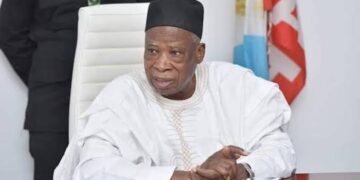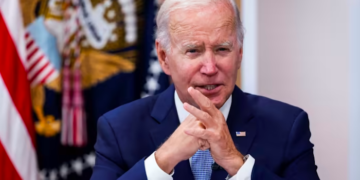The Independent National Electoral Commission (INEC) cannot cease voter registration on 30 June 2022, according to a federal high court in Abuja.
Today, Honorable Justice Mobolaji Olajuwon (Court 10) issued an order of temporary injunction following the hearing of Socio-Economic Rights and Accountability Project’s argument on motion exparte (SERAP).
SERAP and 185 concerned Nigerians filed the lawsuit against INEC at the beginning of this month, asking the court to “declare unconstitutional, illegal, and incompatible with international standards the electoral body’s refusal to extend the deadline for voter registration to allow eligible Nigerians to exercise their rights.”
In the lawsuit, SERAP asked the court for “an order restraining INEC, its agents, privies, assigns, and any other person(s) claiming through it from discontinuing the continuous voters’ registration exercise from June 30, 2022 or any other date pending the hearing and determination of the motion on notice.”
The hearing on the Motion on Notice for interlocutory injunction has been postponed until June 29, 2022.
The lawsuit followed INEC’s decision to extend the deadline for political party primaries by six days, from June 3 to June 9.
However, the commission failed to prolong online pre-registration, which concluded on 30 May 2022, and Continuous Voter Registration (CVR), which ended on 30 June 2022.
In suit number FHC/L/CS/1034/2022 filed at the Federal High Court in Lagos and transferred to Abuja, SERAP asks the court to determine “whether INEC’s refusal to extend the deadline for voter registration violates the Nigerian Constitution, 1999 [as amended], the Electoral Act, and international standards.”
SERAP is requesting that the court declare that INEC’s refusal to extend the deadline for voter registration violates the rights of eligible Nigerians to freely participate in their own government, equality, and equal protection.
SERAP is also requesting “an order of mandamus to direct and compel INEC to extend voter registration by at least three months and to take effective measures to guarantee that eligible Nigerians can register to exercise their right to vote in the 2023 general elections.”
The complaint stated, in part, that enforcing an unrealistic deadline for voter registration while extending the time for party primaries would violate the constitutional and international human rights of eligible voters.
“INEC responsibilities must be carried out in a fair, just, and nondiscriminatory way.
The expansion of voter registration would guarantee that all Nigerian voters are treated fairly and equally.
The future of democracy in Nigeria hinges on it.”
“Voters are also essential participants in the electoral process.
A fair treatment of all eligible Nigerian voters will promote the people’s right to vote and participate in their own governance.
“INEC must not only be independent and impartial in the exercise of its constitutional and legislative obligations, but also be perceived as such.
“Extending voter registration would also increase voter confidence in the voting process.
“The right to vote is one of the most precious rights of the people.
The commission has a constitutional and statutory obligation to ensure that all eligible voters effectively exercise their right to participate in their own governance.”
“Extending the date for party primaries without allowing eligible voters sufficient time and opportunity to register and participate in the 2023 general elections would amount to an unfair and discriminatory treatment of Nigerian voters and breach other human rights.”
“Extending the voter registration deadline would provide eligible voters, including young people, the elderly, and those with disabilities, as well as residents of states facing security challenges and those living in IDP camps, with additional time to register and participate in the 2023 elections.”
“Extending the deadline for voter registration would be compatible with constitutional, international, and Electoral Act requirements.
Any such delay would have no detrimental influence on INEC’s election schedule or activities.”
“The public’s impression of INEC’s independence and impartiality is crucial for fostering public trust in the electoral process and guaranteeing the credibility and legitimacy of the 2023 elections.”
When Nigerians have reservations about the independence and impartiality of INEC, they are less likely to have faith in the electoral process, ultimately undermining democracy.
“Extending the deadline for voter registration would also be justifiable, given reports of difficulties in the voter registration process, particularly for young people, the elderly, those with impairments, and those residing in states with security issues and living in IDP camps,”
Through democratic elections, the will of the people is expressed. This implies that individuals have sufficient time and opportunity to register to vote.
Extending the deadline for voter registration is essential for promoting the impartiality and independence of INEC and enhancing public confidence in the electoral process.”
Section 14(1 (c) of the Nigerian Constitution of 1999 (as amended) states, “The involvement of the people in their governance should be guaranteed in conformity with the provisions of this Constitution.”
“Section 9(6) of the Electoral Act 2022 states that ‘the registration of voters, updating and modification of the Register of Voters under this section should not cease later than ninety days before to any election covered by this Act.'”
The International Covenant on Civil and Political Rights, the African Charter on Human and Peoples’ Rights, and the African Charter on Democracy, Elections, and Governance all protect the right to political participation.
“These human rights treaties also oblige states parties, including Nigeria, to safeguard the independence and impartiality of national electoral authorities responsible for election management and to support the formation of the essential conditions to encourage citizen participation.”
“The right of the people to participate in their government is a key aspect of any democratic society, and any unreasonable restriction of this right would undermine representative governance.”





























